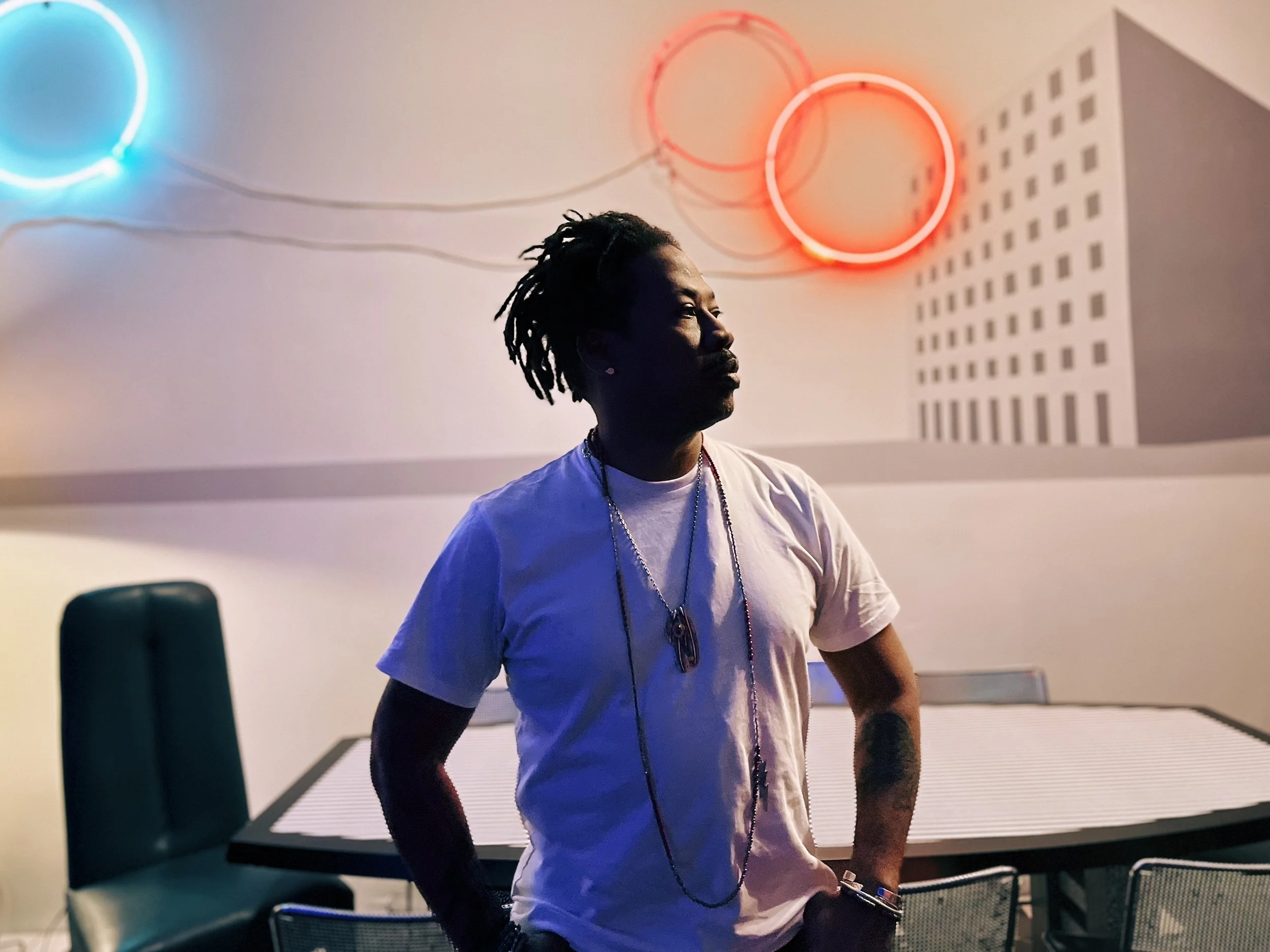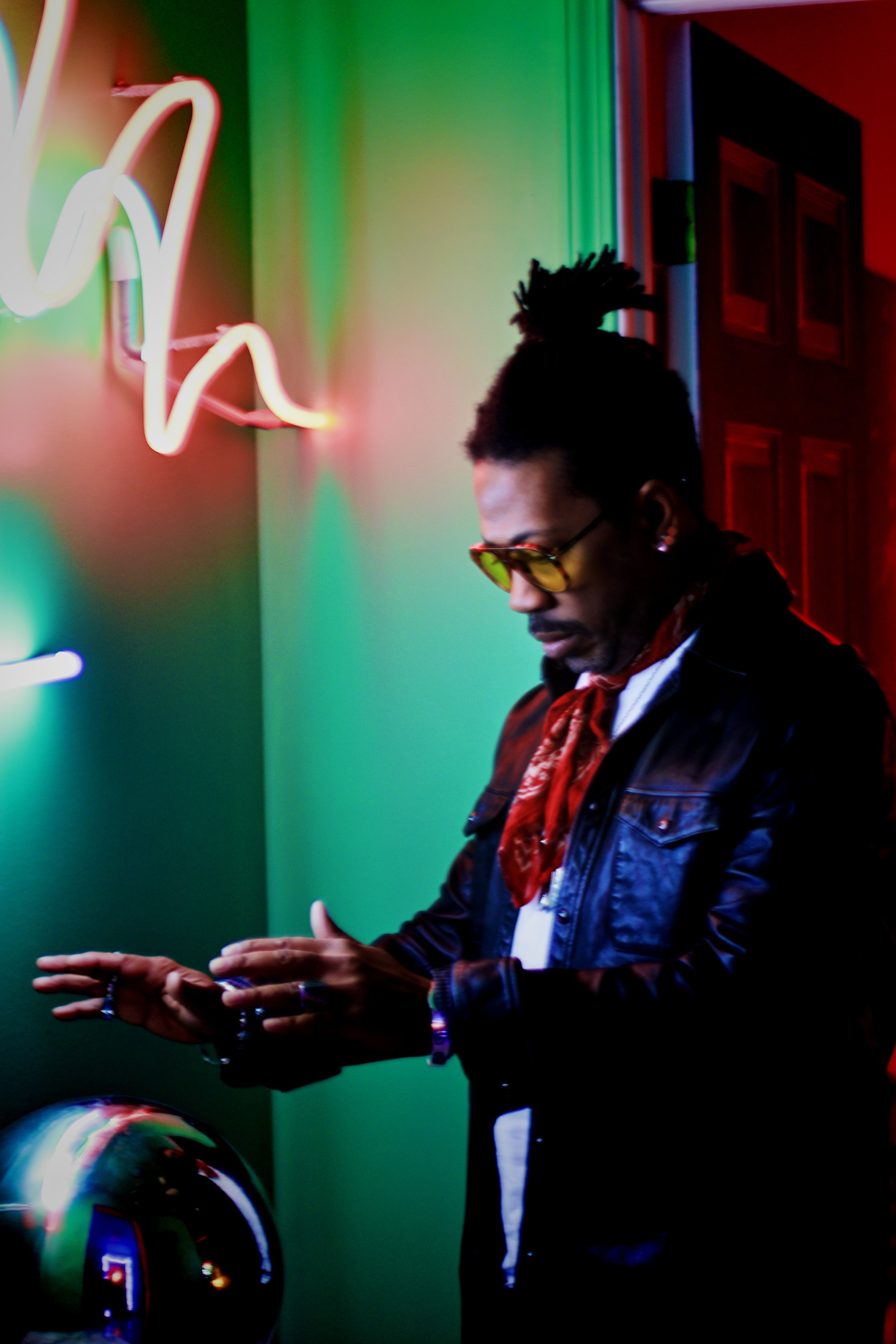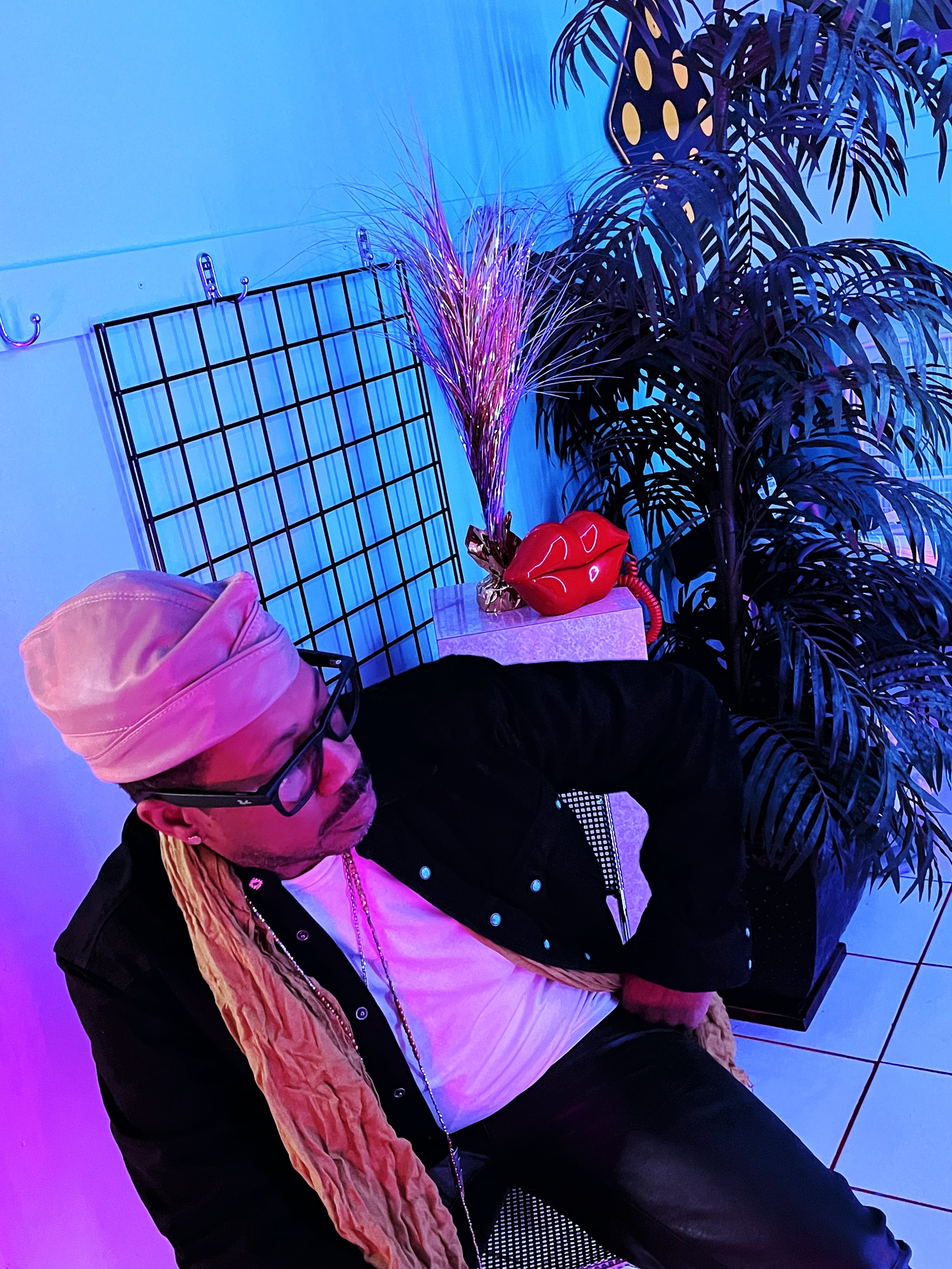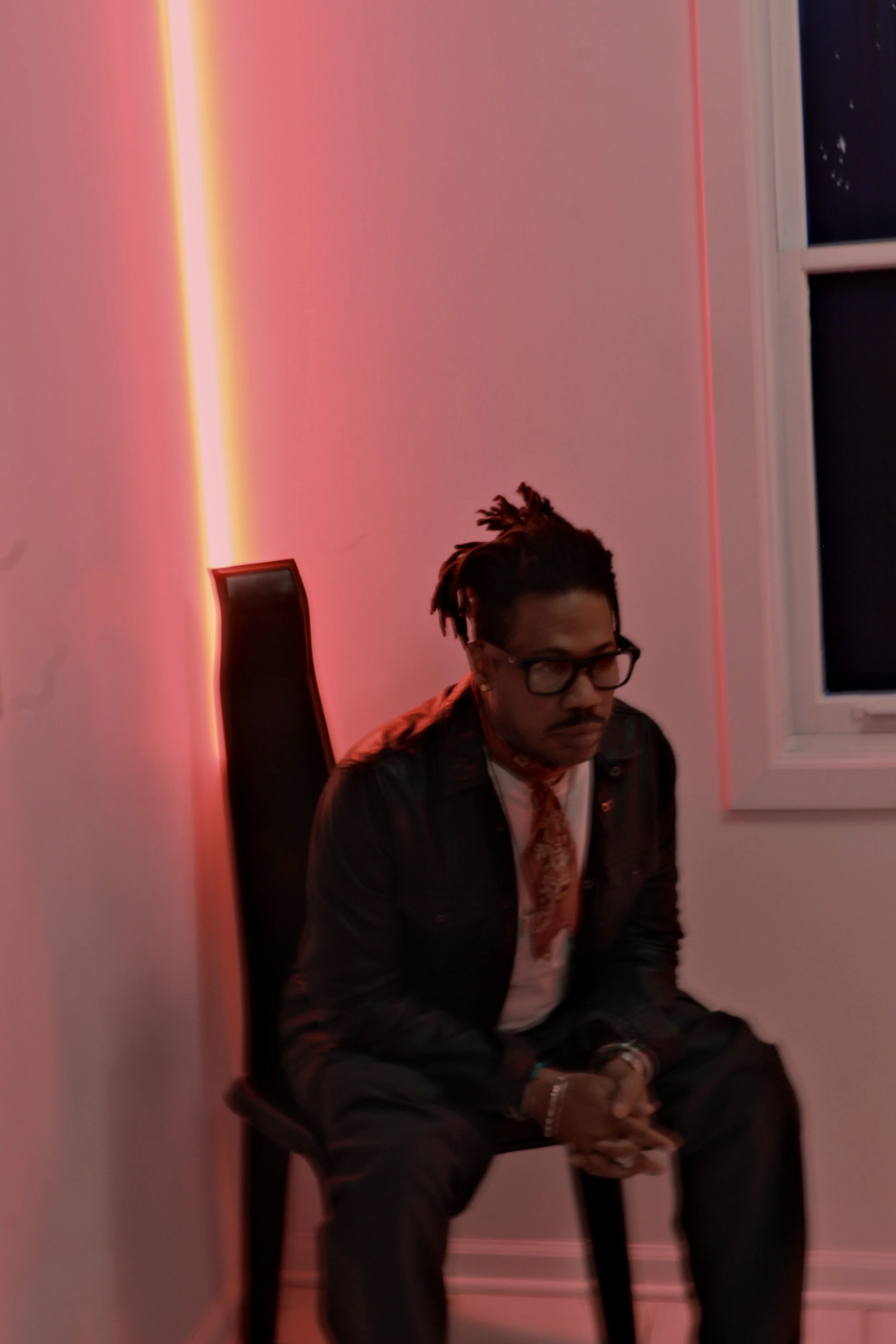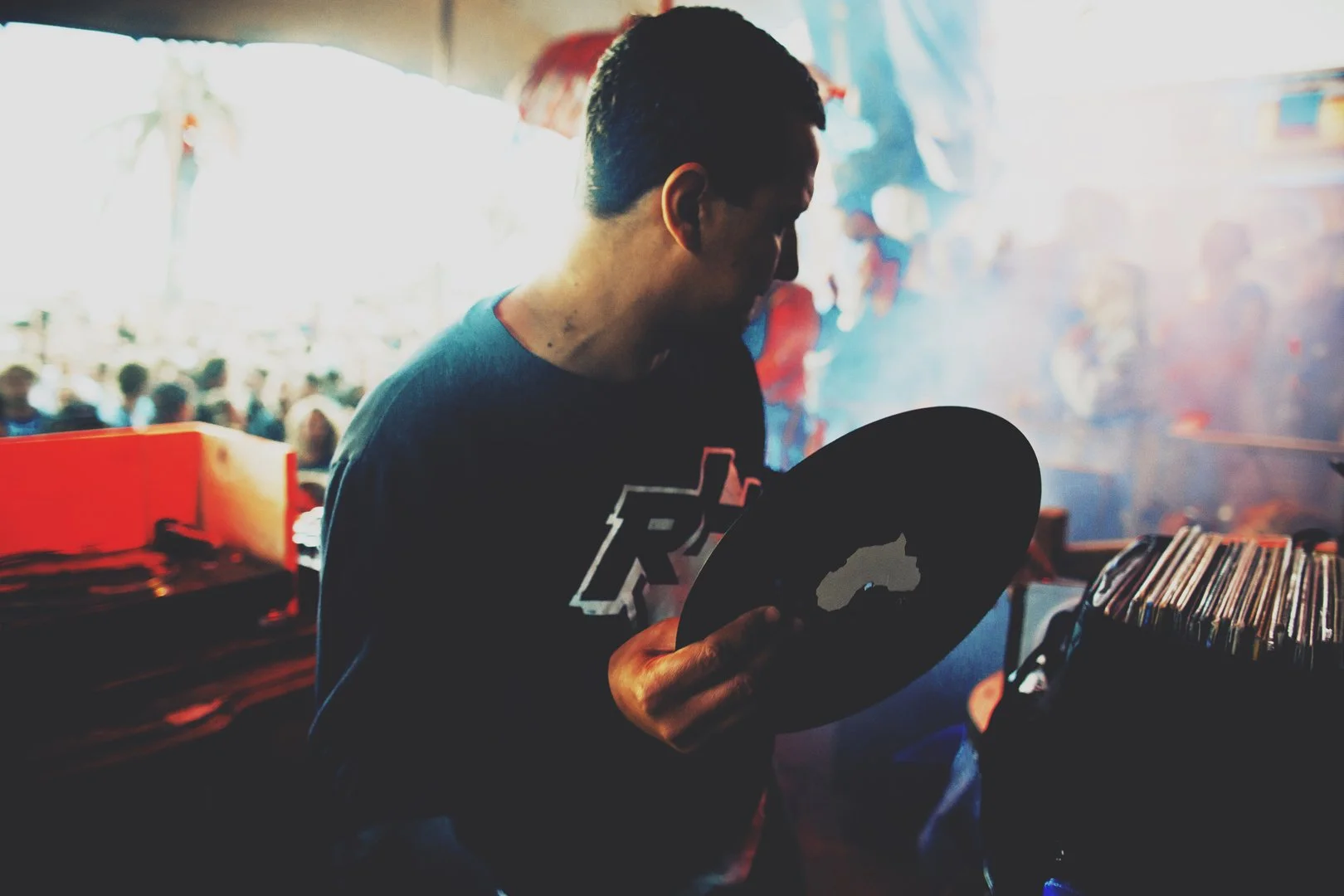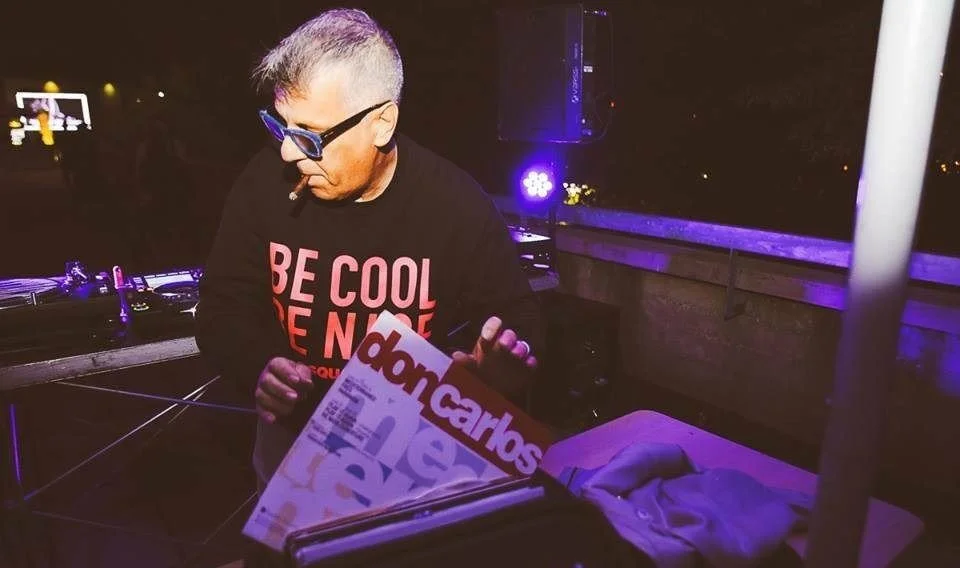“It's all a part of something that's evolving” Ron Trent’s Lift Off into the ancient future
The timeless artist on dance music’s past, present, and road ahead
Words by Rocco Universal
“Let’s get into it, man. I got my coffee in hand and I’m ready to go.”
Ron Trent lights up with enthusiasm as he sits down to speak via Zoom. Animated and with a broad smile on his face, his vibrations resonate. Perched in the centre of the screen, the background wallpaper is the distinctive 80s-inspired artwork from his latest album project, Lift Off. “I thought you’d get a kick out of the wallpaper,” chuckles Trent.
An airbrushed POV image of a driver and passenger in a sporty car, hurtling towards a retro-futurist horizon. An abstract landscape of city lights, planets, a pyramid, a resting panther — the cover gives much away about the tone and content of the music held within. “It's kind of playing with your mind, playing with the ideas, and getting people to think in terms of abstractness.”
Trent is one of dance music’s living legends. Active since not quite the beginning, but closer than most, he’s one of the very few artists who’ve consistently contributed vital music from near enough the birth of the contemporary scene up to and including the present day.
He hit the ground running when his production debut landed back in 1990, with the seminal ‘The Afterlife’ EP on Warehouse Records. He’s since released countless records on labels including Sacred Medicine, Music and Power, Future Vision Records, Rush Hour, and the Prescription label he co-founded. While naturally associated with the Chicago house sound, his music has continually evolved, with releases ranging from the jacking to soul-rich, and the expansive arrangements and percussive spiritualism that form a large portion of his catalogue.
Back on Amsterdam’s subcultural beacon, Rush Hour, Lift Off is Trent’s seventh long-player, following on from 2022’s What Do The Stars Say To You, released under the WARM moniker. On the surface, it’s far removed from the floor-focused Chicago sound with which his name is intrinsically linked. But dig a little deeper, and the album reveals itself as both a tribute to the very roots of the scene and a vision of what’s to come.
Finding Trent at his most sonically diverse, the new album blurs musical lines, inspired by and offering unique takes on many of his influences.
As someone who has been a figurehead for as long as he has, there aren’t too many better placed than Ron Trent to provide a sermon on what’s real, as, tragically, all too many of the early protagonists and would-be senators are no longer with us.
“Primarily, I think it's the time is now, mainly because we've reached a point in history where we're losing elders,” he says, referencing the likes of Quincy Jones and Roy Ayers who have passed in very recent times.
The diverse musical blend that informed the early house sound forged in Chi-Town is perhaps lost on all but the most deep-digging of today’s dance music aficionados. A great deal more than four on the floor lies at the roots of the scene, and Ron believes the time is right for a little schooling.
“Dance music and even DJing is very formulaic now. You know what I'm saying? It's in a box. And the thing is, is that the power and the history are where the dynamics are and where the real interesting story is, you know? And a lot of younger people don't know what that is because they haven’t had certain experiences. So it's kind of like a project to bridge things, you know? The past and where we are and where we're going into the future.”
The album was originally intended to take the form of a compilation, part of a series imagined by Rush Hour boss Antal following previous instalments from label regulars Hunee and Sassy J. “My original concept back then was that I wanted to do somewhat of a soundtrack, if you will, a sonic storybook of coming up in Chicago. The music and the culture and everything that composed where we are today.” The compilation was due to feature a selection of formative tracks that echoed across the dancefloors of Chicago’s burgeoning house movement in the mid-to-late 80s and early 90s. “From Simple Minds to Wally Badarou.”
Of course, the story of house music isn't confined to Chicago’s city limits, and the sounds presented in Lift Off reflect these diverse influences.
“Some of the ingredients of what made up our scene and our culture and coming up in Chicago, coming up in New York — because it was a big symbiotic thing that was going on between Chicago and New York, especially because of the relationship between Frankie [Knuckles] and Larry [Levan].
“We were being trained a certain way, for those of us that were tuned into the underground, you know, because it wasn't for everybody. You know, let's just be very clear. It wasn't like everybody was walking around with Walkmans on and into this music. You had the super mainstream, and then you had the super underground. And the underground was very small.”
The esoteric nature of the early house scene means the pool was compact to begin with. Add to the passing of time the AIDS epidemic that took too many of the community during the 80s and 90s, and many of the founders or those who experienced the scene first-hand are no longer alive to tell the tale.
“If you just do the math, man,” says Ron. “It was a small percentage of people that would listen to this music, actually getting trained by Ron Hardy or Frankie [Knuckles] or whoever in their houses — meaning the Warehouse or Music Box or Power Plant, or little offshoot parties. There aren’t so many people left who were actually there. So the information is skewed. It’s like, second-hand, third-hand. The main thing is to be able to bring a cohesive sonic story in a sense and start the conversation about what it was really about and why.”
Far from just straight-up four-to-the-floor music, house music’s roots extend into Italo, new wave, gospel, R&B, alternative and far beyond. “It was just very vast, man.”
Trent acknowledges that these sounds continue to vibrate in certain corners of the dance spectrum, with a new generation of diggers and vinyl heads diligently researching forgotten sounds.
“It's very much trending now. So, you see a lot of people trying to find obscure jams and that kind of thing. But, you know, the bottom line is that you had to have an open mind, right? And that philosophy, that’s what this album is about. Even the artwork, you know what I mean? It's kind of like something you would have seen in the 80s or the 70s.”
The evocative sleeve art hints at an exoticism that fuelled the symbiotic nature of contemporary dance music’s birth. American disco records would inspire European artists to create the Italo sound, for example, which would, in turn, inform the sets and productions of the house pioneers — crisscrossing the Atlantic to form a scattered creative milieu, even if the creators themselves were often unaware of the impact their music was having on the reverse side of the pond.
“Tunes that were commonplace for us or stuff that we grew up on in our living rooms or on the radio, or stuff that we had in our private collections or our parents listened to, that was second nature for us, right? But those things were also exotic to people in other places. And the music that they were listening to was exotic to us.
“So it was this cross-cultural clash that created all of this interesting music and interesting scenes. We were highly influenced, man, by fashion, music that was coming from other places. Because it opened our minds up, and made us want to reach for some other place or some other thing. It's like, we don't see this in front of us, so we're gonna create it.”
“So that's what industrialised the whole situation in a sense, and made us go in and start dialling out on drum machines and keyboards. Necessity is the mother of invention. And if it was a beat machine and a keyboard that you had to express yourself, that's what you did.”
It’s not difficult to understand why Ron Trent has endured in a notoriously fickle scene. The passion with which he speaks and the energy he projects — in person, behind the turntables, or in his music — is infectious. While honouring the past, he adopts a forward-facing approach, embracing new technology as well as musical ideas to find balance in these opposites.
“You know, really, it should be just a handshake. It should be a continuing story versus being, ‘oh, that’s old and this is new’. It's all a part of something that's evolving, right? That's why the engagement of ancient future is very important.”
Sonically, Lift Off is a study of this concept, with vintage musical flourishes combined with cutting-edge sonics. Far from being a pastiche, it’s a heartfelt tribute to a forgotten past and an unknown future: a timeless, circular bridge connecting eras.
“I'm presenting a certain aesthetic from my filter, to the best of my ability. And this is what it sounds like to me. I don't have a time machine, I certainly can't go back to 1982 and sit in the studio again, but I can get inspired by some of those elements and put them into this moment, you know. And to me, that's the art form, that's the beauty.”
Throughout his career, in the studio or in the booth, Ron has found musical inspiration where live meets electronic, blending loose-limbed percussion with meandering synths, organic instrumental flourishes with raw machine funk.
“That's when you bring heaven and earth together. You know, electronics being kind of ethereal and earth being instruments, made from wood and shit like that. Mix those things together and you can create a world.”
Ron feels that the early 80s represent something of a golden age, with bands and musicians embracing newly introduced electronic musical instruments — affordable synths, samplers, drum machines and the like. “When you had new technology and innovation coming into play, but you still had people who could play instruments, mixing those things together. That sound, oh my God, you can't beat it. That's why motherfuckers sample this shit to this day. And we keep going back to that because of its feelings, it's organic, and our bodies resonate with that better too.
“Because we're organic beings. So automatically we're going to feel like a certain attraction to the wood or to the earth and that kind of robust sound.”
Maintaining this connection to the human elements of music is vital for Ron, and the tendency to reject the craft in favour of modern technological shortcuts is damaging the soul of today’s scene.
“I think that a lot of people got very comfortable 'cause we have a lot of technology now. Social media is running shit, as we know. And because of that, it's made some of the people, if not most of the people, very lazy. And they're comfortable with that.”
The rise of social media has shifted the focus from the core of what gave dance music its power. Heads down, feelings of release, faceless expression, togetherness. The music came first. Today, an unhealthy percentage of those ostensibly at the forefront of the scene are image-obsessed, thirsty for likes, and highly adept at Instagram but, in too many cases, less than intimately familiar with the musical craft.
“Some people are not even mixing. They just twist the knobs and shit, and so the creative value is lost in a sense.”
The timing of the release feels particularly fitting, then. Not only for the artist himself, but for the scene as a whole. Depending on one’s outlook, it could be argued that the club scene is in crisis. It’s no secret that venues have been closing at an alarming rate, and the cost-of-living crisis isn’t the only source of the slowdown.
“There is this consensus amongst Gen Zers that, you know, the club scene is not happening any more because they're not having an experience. And I know why that is. I absolutely know why that is.”
“They kind of engage with the music and the culture from a very surface level. Instead of it being an immersive situation, they’re just waiting for triggers, breakdowns and songs and shit like that, and trying to fit in. And they're heady, but they're not grounded and they don't feel shit, you know? And the people that they're following are dealing with this surface-level philosophy too.”
“What makes it interesting about presenting music to people is doing it with style and taste and being able to communicate to people in a certain way. And the sonics, all the dynamics. And that means putting in a certain amount of hours into your work, into your craft, so that you understand it fully and you can embrace it, because it's an instrument, right? It's the same thing as playing an instrument.”
“I mean, I picked up guitar in the last four, five years, you know, and I'm used to playing keyboards and I grew up playing drums and that kind of thing, but you literally have to sit with it and deal with it. You know what I mean? It's an internal struggle.
“So the point is, is that you develop this skillset and in that, dealing with it from a soul place versus it being like this ‘it looks good on camera’ kind of thing. They're more interested in holding the guitar and how it looks than actually playing the guitar.”
Far from being crestfallen, Ron uses this as an impetus to carry on his work, to spread his word. “We got to grind even more. We have to, it's our job to teach, too. We can't give that up.”
With younger generations seemingly less interested in the dance, and plenty of former party people giving up the often nocturnal club life in favour of more obviously health-centred activities, Ron has a message for those who feel coming together on a dancefloor has lost its appeal.
“People are trying to replace it now with yoga and going to the gym and that kind of thing. This was all of that. You know, it's a spiritual toning. It's a musical engagement. It's a workout for the body. But a lot of people haven't experienced it on that level because it hasn't been presented to them on that level.”
He suggests that the more visible, business end of the scene likely alienates a large number of people who might otherwise experience joy in the clubs, where drug-addled punters fist-pump to loud music played at furious tempos. “I mean, if I saw that and I didn't know what the fuck was going on, I'd be like, I don't want to fuck with that either. I don't want to go listen to music that sounds like I'm being chased around the club,” he laughs.
Ron’s music is the antithesis of that formula. Anyone who has lost themselves on the floor to one of his skillfully crafted sets or epic spiritual house arrangements will be unsurprised that he studied architecture as a younger man. This design-centric background continues to inform his music.
“I'm always thinking about building. I was the kid playing with Legos and shit like that, nerding out. And then I started off with mechanical drawing and that kind of thing, but that was where I left it.
“I'm more into the spiritual science of those things. Sacred geometry and all these other kinds of things. These things have power and these are ancient tools, man, They’re already in our DNA.”
Ron Trent’s Lift Off is out now on Rush Hour

